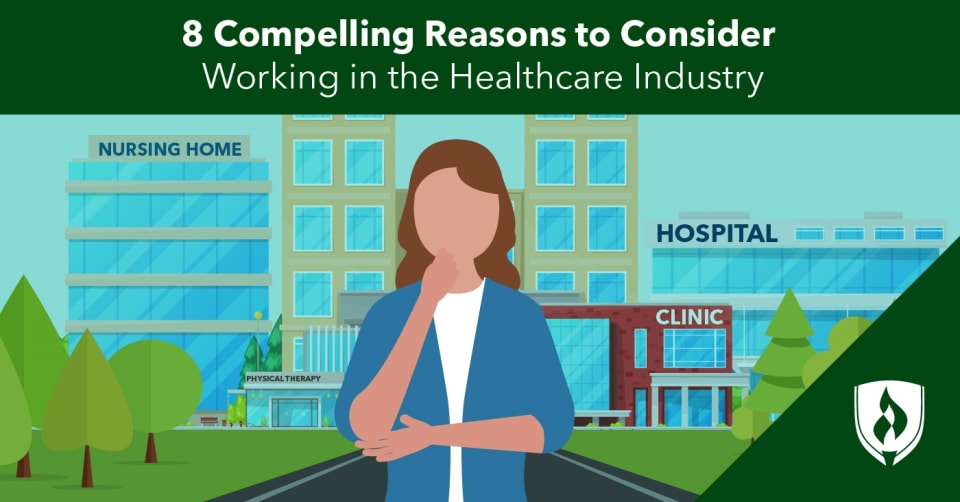8 Compelling Reasons to Consider Working in the Healthcare Industry
By Ashley Brooks on 05/31/2021

Finding yourself less than thrilled with your current job? Maybe the work bores you, or there’s no room for advancement, or the money just isn’t cutting it. If you’d rather put your natural talents to better use, it might be time to give some serious consideration to a new career in the healthcare industry.
The healthcare field is in a strong position for overall growth. The Bureau of Labor Statistics (BLS) reports that healthcare occupations are projected to add more jobs than any other occupational group from 2019–2029.1 That fact alone should keep potentially pursuing a healthcare job firmly on your radar. Of course, there’s more to consider when making a career switch—you want to find a role that best fits your needs and goals.
The good news is the healthcare industry is vast enough to offer a variety of compelling careers, no matter your skills and educational background. What’s more? Many of these jobs all come with appealing benefits that just might pique your interest. Read on to discover eight compelling reasons to consider a career in the healthcare industry.
Why work in healthcare? 8 Reasons to consider
There’s a lot to like about a potential healthcare career. While not everything on this list will universally apply to all jobs in the field, this can serve as a good general starting point for when you’re debating the pros and cons of a healthcare career versus others.
1. Job opportunities
An impressive salary would be great and all, but it won’t do you any good if these job opportunities are scarce in the first place. The good news is that, as mentioned above, the healthcare field is well positioned for growing demand. The medical needs of aging baby boomers mean the healthcare industry is continuing to expand, with the BLS projecting the healthcare field to add approximately 2.4 million new jobs from 2019–2029.
Take a look at the BLS projections for job opportunities in these health-related job titles:1
- Laboratory technologists and technicians: 7% projected employment growth
- Medical assistants: 19% projected employment growth
- Physical therapy assistants and aides: 29% projected employment growth
- Radiologic technicians and technologists: 7% projected employment growth
- Surgical technologists: 7% projected employment growth
2. Potential for flexible schedules
Because people need medical attention at all times of day and night, many healthcare roles allow you to work flexible hours. There are multiple opportunities to work second shift or overnights, enjoy short workweeks or even work remotely if qualified.
Registered nurses (RNs) are especially known for the benefits of unconventional schedules, including three-day workweeks. RNs aren’t the only healthcare workers benefiting from these flexible schedules. Other positions with flexibility include home health aides, pharmacy technicians, and radiologic and MRI technologists.
Of course, there can be drawbacks with healthcare field schedules—sickness doesn’t care if it’s a holiday, after all—but many who work unconventional, condensed schedule swear by it.
3. It’s a respectable line of work
It’s an unpleasant truth, but not everyone comes home from a day of work with a sense of pride. Jobs for many people can be just a dreary means to an end. But with healthcare roles, your work is in support of a clearly positive goal—helping patients maintain their health as best they can.
With that comes some measure of respect. An international YouGov poll found that medical doctors, nurses and elderly care workers all received positive net favorability ratings from the public.2 While this poll doesn’t drill down into the specifics for why people feel this way, it’s easy to venture a guess: It’s because they help people! A career is a long grind, so knowing that, even on otherwise-forgettable days, you can be playing a role in helping someone feel better can be a big plus.
4. Variety of educational paths
The path to entering the healthcare field is not one-size-fits-all. Not all healthcare workers need eight years of schooling and a residency before they can begin their careers. For instance, some healthcare roles, like pharmacy technicians or medical assistants, have education options that can be completed in less time than an Associate’s degree.
Many others, like surgical technologists, radiologic technologists, physical therapist assistants, medical laboratory technicians and more can find themselves positioned for success with Associate’s degrees. Other roles, like in nursing, offer education pathways from a Practical Nursing Diploma on up to a graduate degree. No matter what your appetite for higher education may be, you can find a healthcare career-focused program to fit your needs.
5. Jobs for every personality type
The healthcare industry offers a wide variety of careers—there’s something for everyone! From lower-stress nursing jobs to medical jobs for people who don’t like blood, there’s a healthcare career for you.
If you love being around people, consider a patient-facing career like nursing. If you like to solve puzzles, dig deep into scientific research or shape policy that helps prevent disease outbreaks, like the recent COVID-19 pandemic, an education in public health might be just the ticket. Possibilities abound when it comes to a healthcare career that matches your interests and personality.
6. Stimulating work environments
If you’re the kind of person who likes to experience something new and different every day, healthcare offers plenty of variety in terms of people you’ll meet, problems you’ve solve and places you’ll go. Working in a clinic, hospital or urgent care environment is often a great fit for people who like to work on their feet while in a fast-paced setting.
There are great healthcare roles if you like working with your hands, but not doing quite as much patient interaction, such as that of a Surgical Technologist.
Healthcare jobs that aren’t patient-facing also require work that is thoughtful and necessary to keeping clinical environments running smoothly. Health information professionals have unique perspectives into the production, storage and management of the important health information records that fuel research, patient billing and more.
7. The work can be fulfilling
It might seem like a small thing, but a lack of rewarding work in your daily job duties can be a significant drain. The American Psychological Association reports that finding meaning in your work leads to a long list of benefits, including increased motivation, increased job satisfaction and decreased stress.
Work is such an enormous part of modern life. If it’s important to you that your time is spent making a difference in the lives of individuals and communities, healthcare is a great industry. Every single day, healthcare workers are required to care about others, whether it’s patients who need preventative care or attention throughout the healing and recovery process, families seeking assistance navigating difficult and complex medical situations or medical facilities that require behind-the-scenes support to keep smoothly and safely delivering service.
8. Healthcare professionals are needed everywhere
In many healthcare roles, you could move just about anywhere in the country (or even globally) and find plenty of people who need your skillset. Healthcare is a fundamental human need--anywhere you find people, you'll find a demand for professionals who know how to heal them.
Some roles, like nursing, are in a perpetual state of shortage because the demand is so high for their services.
Take the next step
There’s a lot to like about working in healthcare. But if you’re seriously considering a move into this field, you likely have some important research to do as you narrow down your options. One solid way to start is to focus on what could be accomplished sooner than later. Our article “ Exploring 12 Healthcare Jobs You Can Launch in 2 Years or Less” can provide an excellent overview of your options. Have a weak stomach? Check out medical careers for weak stomachs.
1Bureau of Labor Statistics, U.S. Department of Labor, Occupational Outlook Handbook, [accessed April, 2021] www.bls.gov/ooh/. Information represents national, averaged data for the occupations listed and includes workers at all levels of education and experience. Employment conditions in your area may vary.
2YouGov, “Scientists and Doctors Are the Most Respected Professions Worldwide” [accessed April 2021] https://today.yougov.com/topics/economy/articles-reports/2021/02/08/international-profession-perception-poll-data
3American Psychological Association, “More Than Job Satisfaction: Psychologists Are Discovering What Makes Work Meaningful—and How to Create Value in Any Job” [accessed April 2021] https://www.apa.org/monitor/2013/12/job-satisfaction




